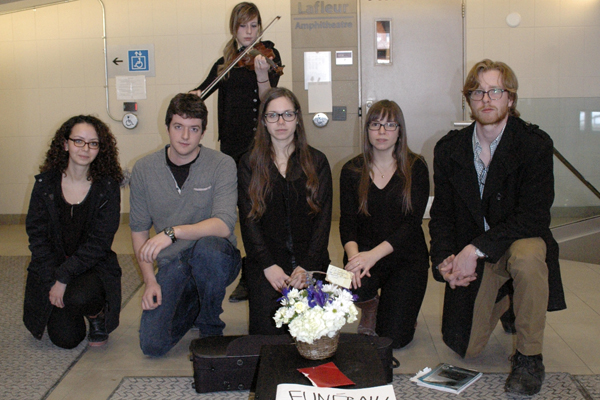Civil law students say tuition fee increases will make school unaffordable
Photo by Tina WallaceCivil law students at the University of Ottawa held a funeral procession March 25 from Fauteux Hall to U of O president Allan Rock’s office to mourn the “death of the civil law program for the middle class.”
In the last five years, tuition fees for a first-year civil law student have risen by 37.5 per cent. While it cost $7,400 per year in 2009, tuition will rise to $9,716 in September 2014. This increase of approximately 8 per cent per year means less students will be able to afford the program as time goes on, according to Meunier.
“We hope to have a symbolic impact,” said Gabriel Meunier, a student in his last year of civil law. “We wanted to demonstrate our passive opposition one last time. We may have lost, but that does not mean that we accept the situation.”
Meunier said that because there is no faculty of law in Outaouais, students from the area study at the U of O if they want to live at home. He said $10,000 is a “psychological threshold,” and that once tuition fees surpass that amount, “there is nothing stopping them from increasing it further.” He said once fees reach $10,000, they will enter a new margin and will increase more steadily.
“People tend to say ‘in Quebec, it’s three times less expensive’,” said Sébastien Grammond, dean of the faculty of civil law at the U of O, in an interview with Le Flagrant Délit, a publication by civil law students. “It’s normal to make that instinctive comparison, but the financial framework is different in Ontario, and so we cannot make that comparison. Furthermore, when we compare our university to the ones in Quebec, we notice that we can offer a better service to students. We have a ratio of professors to students that is more favourable.”
Meunier said he has been involved in other strategies to protest the increase, but that the university administration “didn’t consider our arguments at all.”
Grammond said an increase in staff wages and pension funds for the employees, and a Government of Ontario decrease in subsidies by 1 per cent per student, contributed to a necessary increase in tuition fees.
“What frustrates me the most is how insensitive the rector (Rock) is to our demands,” Meunier said. “I understand that he has to defend the university’s position, but he could have shown some empathy to the reality of our situation.”
At the U of O, tuition fees are more expensive for the professional disciplines, like medicine, engineering, and law, but according to Meunier these fees are disproportionate to the wages a civil law student will make at the start of their career.
“There will always be enough students who want to study here,” he said. “But the question is whether the middle-class students will be able to. Do people just come here to buy their diploma? Or do we want to give people the accessibility to study law?”





